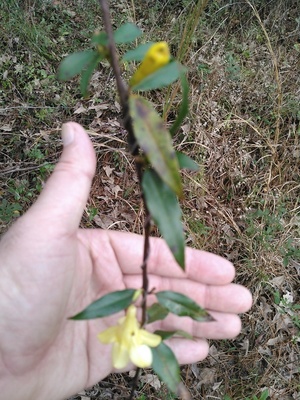What do you do if someboby else is using the firestarter? Spread the prescribe burn with a rake!
Category Archives: Okra Paradise Farms
Dog Fire
Yellow Dog is really not easily impressed.
 Burning the woods 10 feet in front of her dog house produced a lot of smoke, as you can see.
Did she care?
Burning the woods 10 feet in front of her dog house produced a lot of smoke, as you can see.
Did she care?
Is there something in there?
Continue readingDogs in the culvert, TV on the road
 Dogs don’t care about TV unles they’re on it; culverts are much more fun.
Yellow Dog was curious enough
to sniff around the TV camera,
but mostly they sniffed under things, laid in the dirt, and sat in the doggie fort.
Dogs don’t care about TV unles they’re on it; culverts are much more fun.
Yellow Dog was curious enough
to sniff around the TV camera,
but mostly they sniffed under things, laid in the dirt, and sat in the doggie fort.
Here’s a video. The incessant hissing is what that tiny natural gas pipeline station for a mere 9-inch pipeline sounds like 24/7, 365 days a year.
Continue readingSouth Georgia Growing Local on the air and on the ground at Pine Grove Middle School
Update 2016-01-28: Video of Gretchen on Talk 92.1FM Scott James show.
FOR IMMEDIATE RELEASE
South Georgia Growing Local on the air and on the ground at Pine Grove Middle School
Hahira, January 25, 2016 — Tuesday morning 8:30 AM, Gretchen
Quarterman will be on the Scott James radio show,
 92.1 FM, talking
about South Georgia Growing Conference, happening again at Pine
Grove Middle School, all day Saturday February 6th.
“This has really turned into a thing!” as Chris Beckham said on his 105.9 FM
radio show when Gretchen was on there last Wednesday, “So many
different topics in six tracks, but all indigenous to south
Georgia.”
92.1 FM, talking
about South Georgia Growing Conference, happening again at Pine
Grove Middle School, all day Saturday February 6th.
“This has really turned into a thing!” as Chris Beckham said on his 105.9 FM
radio show when Gretchen was on there last Wednesday, “So many
different topics in six tracks, but all indigenous to south
Georgia.”
Gretchen explained: Continue reading
Happy Serenity Acres Farm
Julia Shewchuk will present How to make Basic Goat Milk Soap at South Georgia Growing Local in February.
Gretchen Hein, New Leaf Market Co-op, Jan/Feb/Mar 2016, Local Spotlight—Serenity Acres Farm,
“Happy Soaps by Happy Goats,” is the tagline of the Serenity Acres Farm
Goat Soap home page and “happy” describes many things about Serenity Acres Farm. Yes, even how it feels to be lathered by the suds of their goat milk soap.
Owned by Julia and Wayne, Serenity Acres Farm is located in nearby Madison County, Florida. It’s a small farm with a big goal of producing locally grown and farm-raised products free of major pesticides, hormones and genetically modified components. All their animals are Animal Welfare Approved certified and pasture based.
Originally, Julia and Wayne were looking for…. Continue reading
Lesser Known Crops for the Coastal Plain, by Bret Wagenhorst @ SOGALO16
The first posted of many talks you can hear at South Georgia Growing Local in February:
Description of the talk: A presentation of my experience growing, eating, selling various lesser known edible crops
of the coastal plain. I will try to include as many of the following as I can get to in my allotted time slot (not necessarily in this order): Asian yard long beans, bananas, black walnuts, bunching onions, cactus pears, carambola Continue reading
Dogs in Boats
A nice May evening at the pond with dogs in boats.
 Except it was December.
Gretchen posted these
facebook pictures reposted below; click on any small picture to see a larger one.
See also a few more pictures
by jsq.
-jsq
Except it was December.
Gretchen posted these
facebook pictures reposted below; click on any small picture to see a larger one.
See also a few more pictures
by jsq.
-jsq
Graceful Dogs
Yellow Jessamine blooming in December?
In 2008 they bloomed in March,
 in 2011
they bloomed in late February,
in 2012
they bloomed in late January and early February,
in 2013,
they bloomed in the middle of January,
and in 2015, some are blooming in late December.
A couple of days ago, the sweet odor of Jessamine at the gate was overwhelming
on Christmas Day.
Does this seem right to you?
in 2011
they bloomed in late February,
in 2012
they bloomed in late January and early February,
in 2013,
they bloomed in the middle of January,
and in 2015, some are blooming in late December.
A couple of days ago, the sweet odor of Jessamine at the gate was overwhelming
on Christmas Day.
Does this seem right to you?
-jsq


